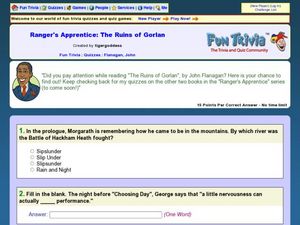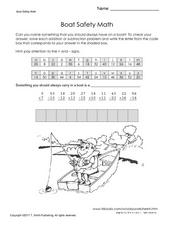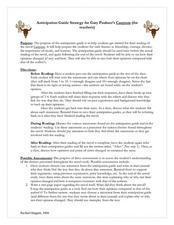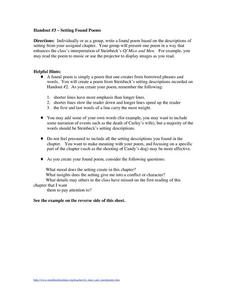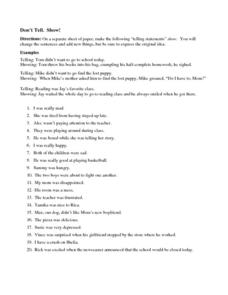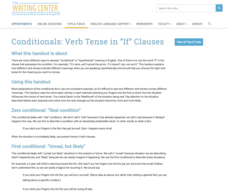Curated OER
Ranger's Apprentice: The Ruins of Gorlan
Check specific recall of events and phrases from Ranger's Apprentice: The Ruins of Gorlan by John Flanagan. Questions focus on exact language, numbers, places, and character names. Be sure your readers know the book by giving them this...
Curated OER
Boat Safety Math
What should you always carry on a boat? Learners must solve ten addition and subtraction problems to solve this riddle. The equations include single and double-digit numbers, but no negative numbers are used. They also don't need to...
Curated OER
Future Perfect Tense with Negatives
Do your young grammarians need extra practice using the correct form of verbs in the future perfect tense with negatives? A 10 sentence activity will reveal whether or not they have mastered this verb sequence. No answer sheet is included.
Curated OER
Anticipation Guide Strategy for Gary Paulsen's Canyons (For Teachers)
"Things never change." "It's okay to steal from those who already have a lot." Before reading Canyons, readers respond to an anticipation guide that focuses on issues raised in Gary Paulsen's novel. Groups share their responses, and...
Curated OER
Guided Imagery: Canyons, Chapter 8
Individuals use words or illustrate what they experience during a reading of a passage from chapter eight of Gary Paulsen's Canyons. Complete directions for the guided imagery exercise, and a suggested passage, are included with the...
Curated OER
Canyons: Magic Square Activity
A fan of magic squares vocabulary activities? Readers use terms drawn from Gary Paulsen’s Canyons to complete an exercise. The worksheet, an answer sheet, as well as complete directions for crafting a magic square, are included.
Curated OER
Unsent Letter: Canyons
As your class reads Gary Paulsen's Canyons, challenge them to assume the perspective of a character to write a letter. The plan suggests learners pair off, one person assuming the voice of Coyote Runs, and the other assuming the voice of...
Curated OER
Story of Self-Choosing to Participate
Everyone has a story; help your writers develop their own with this prewriting packet. Designed for upstanders to share their story and encourage others to be upstanders, this set of questions helps writers craft and structure a story to...
Curated OER
Vocabulary Strategy for Number the Stars
After reading Number the Stars, told from the point of view of Annemarie Johansen, encourage your class to review some of the new vocabulary by completing this crossword puzzle. Fifteen definitions are presented, and learners must...
Curated OER
Art Self-Assessment
Reflection is a wonderful way to understand yourself as a learner or as an artist. Kids write a one-paragraph analysis of their own self-portrait. They focus on style, character traits, and self characterization.
Curated OER
Handout #3-Setting Found Poems
What is a Found Poem? Use excerpts of the setting presented in John Steinbeck's Of Mice and Men to inspire Found Poetry. An explanation is given, and the second page houses an example of a Found Poem inspired by Black Boy, but you'll...
Shmoop
ELA.CCSS.ELA-Literacy.RL.11-12.6
It ‘s assessment check list time, and you have nothing to prove that your learners mastered the skill RL.11-12.6. Rest assured, here is a plan that is sure to appease your administrator. It offers solid examples on the difference between...
Illustrative Mathematics
How is the Weather?
This activity asks learners to interpret data displayed on a graph within the context of the problem. Students are given three graphs that show solar radiation, or intensity of the sun, as a function of time. They are also given three...
Curated OER
Spanish Parts of Speech (Part 1)
Check out this overview of the parts of speech that includes English and Spanish examples. Each part of speech is highlighted in a different color for clarity. There is information on each part of speech here, and you or your pupils can...
Curated OER
Behavior Letter to Parents
Here is a basic behavior letter to be sent home to parents for a signature and comments. It includes a checklist of common problem behaviors that may occur in an elementary classroom.
CMS Education
My Pen Pal
Written in two different languages, this resource offers pupils the opportunity to practice both their English and their Hebrew skills. Young writers respond to a couple of questions to get their ideas flowing. They then compose a letter...
Illustrative Mathematics
Adding Tenths and Hundredths
Learning to add fractions with different denominators presents a big hurdle for many young mathematicians. Simplify the process for learners with this series of practice problems involving the friendly fractions tenths and hundredths....
English Enhanced Scope and Sequence
Blending and Segmenting Multisyllabic
Syl lab i ca tion. Kindergartners practice segmenting and blending multisyllabic words in an activity that asks them to repeat the process modeled by their teacher. The teacher slowly says the name of a classroom object, enunciating each...
E Reading Worksheets
Don't Tell. Show!
As part of a study of narrative writing, young story tellers are asked to revise 20 telling sentences and create showing ones.
Manchester University
Alliteration
Kids create cool clauses selecting a single starting sound. Ah, alliteration.
University of North Carolina
Conditionals: Verb Tense in “If” Clauses
"If you give a mouse a cookie, then he's going to ask for a glass of milk." These iconic words from Laura Numeroff's classic tale offer a great example of conditionals, a topic covered in the handout as part of a larger writing series...
Curated OER
Past Simple
In this past simple instructional activity, students fill in the correct form of the verbs into sentences. Students complete 58 questions total.
Curated OER
Lisa Simpson and Math
In this algebra worksheet, students ponder life's questions presented in several episodes of The Simpson's. They calculate the square root of 1 million and verify known facts concerning pi. There are 9 questions.
Curated OER
History Repeats Itself
Twelfth graders research historical turning points, gather-data, and extrapolate possible alternate outcomes. They work individually to choose one historical event from Attachment D, Historical Turning Points. Students complete either...


